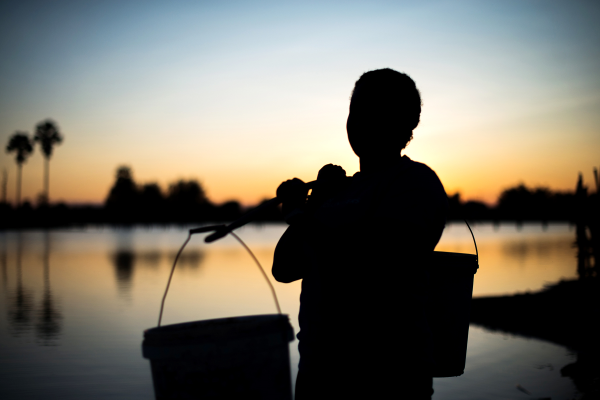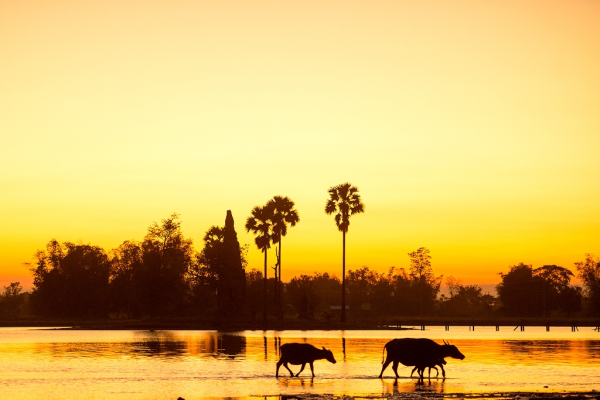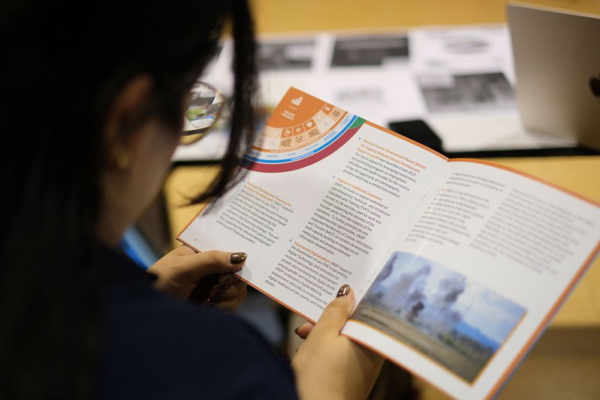KPL
The health of our planet is the foundation upon which all aspects of human well-being depend.
However, the current patterns of economic growth and unsustainable consumption are driving the world toward a triple planetary crisis: a changing climate, loss of biodiversity, and increasing pollution.

(KPL) The health of our planet is the foundation upon which all aspects of human well-being depend.
However, the current patterns of economic growth and unsustainable consumption are driving the world toward a triple planetary crisis: a changing climate, loss of biodiversity, and increasing pollution.
Globally, about ten million hectares are deforested every year and about 69% of wildlife has been lost over the past 50 years. Deforestation contributes to nearly 11% of global greenhouse gas (GHG) emissions, while the loss of biodiversity undermines natural systems that regulate climate and support livelihoods.
At the same time, humans produce over 360 million tons of plastic waste annually, forecasted to double by 2040.
The produced waste ends up in rivers and oceans, harming marine life and entering the food chain. These threats do not exist independently. Forest and wildlife loss accelerate climate change, while pollution further degrades our ecosystems and compromises our well-being, posing significant challenges to our progress and sustainable development.
For the Lao PDR, a country rich in natural resources yet highly vulnerable to environmental and climate shocks, what does this mean? Can economic growth ambitions be achieved without depleting the country’s natural capital?
The country is set to graduate from Least Developed Country (LDC) status in 2026. The intersecting threats of biodiversity loss, climate-related disasters, and mounting plastic waste pollution present significant risks that could undermine the Government’s efforts to advance inclusive growth, resilience, and environmental sustainability.
The country's rich biodiversity and forest ecosystem have long acted as a buffer to protect communities from flooding and droughts. However, changes in land use and pressure on forested areas are threatening ecosystems, affecting the country’s natural capacity to buffer against climate shocks, and increasing vulnerability to extreme weather.

In August 2023, persistent heavy rain led to extensive flooding across central and southern regions, where numerous farms and houses were damaged. It is estimated that over 110,000 people were affected across 12 provinces including Vientiane, Vientiane Province, Bokeo, Huaphan, Luang Prabang, Xayaboury, Xieng Khuang, Borikhamxay, Khammuan, Savannakhet, Champassak, and Xaysomboun.
The total cost of flood damage was estimated at ₭151.9 billion (US$7,613,018).
At the same time, urbanization and changing consumption patterns have significantly contributed to the accumulation of plastic waste, the proliferation of single-use items, and the improper management of waste.
In the cities of Laos, 95% of plastic pollution comes from disposable food and drink packaging, which ends up being burned in the open air or swept or dropped into rivers and other water bodies, including the Mekong River.
The consequences are damaging for both ecosystems and public health. The polluted waterways worsen flood risks and contaminate food sources while burning plastic contributes to air pollution that causes respiratory diseases which disproportionately affect vulnerable and low-income communities.
With over 60% of Laotians relying on natural resources for their livelihood, environmental health has a direct impact on the well-being, income, and food security of the people. At the same time, plastic waste degrades the natural beauty of tourist destinations, posing a growing threat to industry.
Through more integrated approaches to restore ecosystems, foster resilience, and transform consumption patterns and waste management systems, the Lao PDR accelerates its transition toward a greener, more circular and inclusive economy, which can support prosperity while helping to mitigate the triple planetary crisis.
Global Call, Local Responsibility – World Environment Day 2025
The theme of this year’s World Environment Day – #BeatPlastic Pollution – is a call for collective action to transform the way we produce, consume, and manage plastic waste. It is a reminder that if we fail to manage plastic waste, we not only pollute our natural environment but also poison the systems that sustain our well-being, economy, and future development.
By adopting the National Plastic Action Plan (NPAP) 2024-2030, the Government of the Lao PDR has taken a significant step to address plastic pollution. This Action Plan, aligned with the Green Growth Strategy 2030, outlines the country’s commitment to reduce plastic pollution through 1) the development of legislation for plastic waste management; 2) the promotion of alternatives to plastics; 3) the establishment of a monitoring system to track progress; and 4) raising public awareness on reducing and recycling plastics.
Additionally, Laos has signed the ASEAN Bangkok Declaration on Marine Debris and ratified the Basel Convention on the Control of Transboundary Movements of Hazardous Wastes and their Disposal.
Last year, under the Lao PDR Chairmanship, ASEAN Member States adopted the ASEAN Declaration on Plastic Circularity, reinforcing the region’s commitment to tackling plastic pollution. However, policies alone are not enough; they need to be implemented and enforced.
The Lao PDR must take decisive and coordinated action that reflects the urgency of the crisis while recognizing its deep interconnection with climate resilience and the protection of biodiversity and public health.
Waste management infrastructure, particularly in rapidly growning urban areas like Vientiane, must be improved to prevent plastic leakage into water bodies, forests, and farmland. Further investment is required in recycling systems, including the implementation of proper waste collection and disposal methods.
In addition, greater public awareness campaigns can educate people about the health and environmental risks associated with plastic pollution, and encourage behaviour changes.
These efforts must be combined with incentives for private sector innovation to develop sustainable alternatives and improve recycling technologies, as part of a comprehensive approach.
The United Nations Development Programme (UNDP) has been a strong and committed partner to the Lao PDR in advancing solutions that prioritize people, nature, and sustainability.

UNDP has supported the Government of the Lao PDR for decades in developing several key initiatives to foster resilience and biodiversity conservation.
Experiments with social innovation have provided technical and financial support to young innovators to tackle plastic pollution.
As the host agency for the National Plastic Action Partnership, UNDP is supporting the Government of the Lao PDR on the implementation of its National Plastic Action Plan.
UNDP is also assisting the Government of the Lao PDR in developing its Tenth National Socio-Economic Development Plan (2026-2030), and revising its National Biodiversity Strategy and Action Plan (NBSAP) with new targets in line with the Kunming-Montreal Global Biodiversity Framework.
It is also bringing together UN expertise from across the system to provide joint support to the Government to update its Nationally Determine Contribution (NDC 3.0) to the Paris agreement on climate change.
Recognizing that ambitious climate and biodiversity ambitions can only be achieved when plans are backed by adequate financing, UNDP will further support the Government in developing the NDC investment plan and a financing plan for the NBSAP using UNDP BIOFIN approach. Furthermore, UNDP will support the Ministry of Finance in setting up a sustainable finance hub, the first of its kind, that will act as a platform for coordinating policies, instruments, technical assistance, and knowledge-building services to advance climate and sustainable finance in the Lao PDR.
Ending plastic pollution, protecting biodiversity, and building climate resilience are not separate ambitions. They are part of the same fight for advancing the Lao PDR's sustainable development.
If nature is not safeguarded, we will forfeit nature’s protective benefits, along with our own development opportunities.
We must work together to scale what works, connect efforts, and invest in solutions that protect nature, support communities, and secure long-term development for all.
We thank our donors and development partners for their support which is making our work possible: the Global Environment Facility (GEF), through dedicated project funding, as well as bilateral funding partners such as the Republic of Korea, the Republic of Germany, the Kingdom of Denmark, the Grand-Dutchy of Luxembourg, global platforms like the World Economic Forum (WEF), and other development partners, who contribute through various instruments and initiatives. The journey ahead requires bold action with unwavering commitment. By working together, we can turn today’s crisis into opportunities for lasting, positive change for the Lao PDR and its people.
The time to act is now; we cannot afford to wait!
KPL